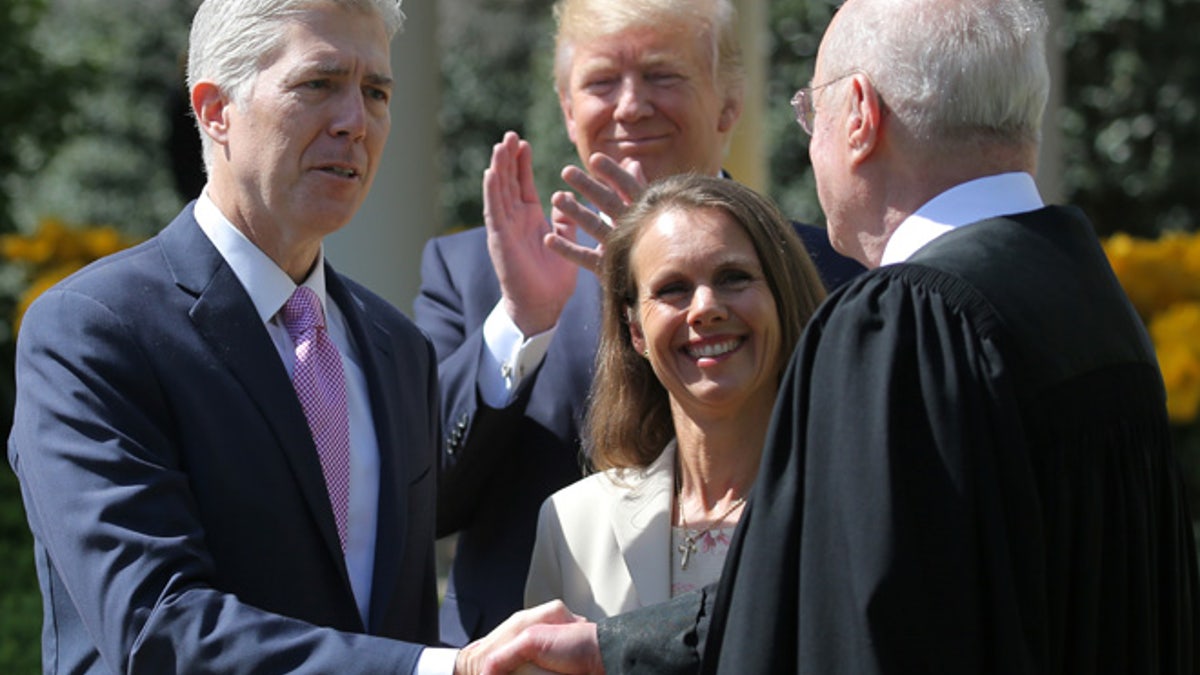
Judge Neil Gorsuch shakes hands with Supreme Court Associate Justice Anthony Kennedy after being sworn in as an Associate Justice of the Supreme Court, accompanied by Louise Gorsuch (C) and U.S. President Donald J. Trump in the Rose Garden of the White House in Washington, U.S., April 10, 2017. REUTERS/Carlos Barria - RTX34YQB (REUTERS)
April 10 marks one year since Justice Neil Gorsuch was officially sworn in as the 101st associate justice of the U.S. Supreme Court. It’s been a year of fulfilled promises. We now know that President Trump kept perhaps his most important campaign promise by nominating a successor to Justice Scalia who would carry on his legacy. And for Justice Gorsuch himself, it has been a year of fulfilling the promise of his confirmation hearings: that he would be a judge committed to fairness and independence, deciding cases on the basis of the law and the Constitution rather than politics or personal feelings.
One of the most striking features of Gorsuch’s first year on the Court is his demonstrated commitment to the constitutional principles he articulated during his confirmation hearings. In his opinions as well as oral arguments, Justice Gorsuch has repeatedly invoked familiar themes.
For example, the theme of commitment to the laws as passed by our elected representatives permeated Gorsuch’s confirmation hearings. He recalled difficult decisions as a circuit judge requiring him to apply laws with which he disagreed. When senators criticized some of his legal conclusions, he explained that it is for Congress to change a law, not the courts. In Gorsuch’s view, a judge’s job is to “try to understand what the words on the page mean. Not import words that come from us. But apply what you, the people's representatives, the lawmakers have done.”
Already Justice Gorsuch has carried out that commitment. In his first day of oral arguments, the junior justice redirected discussion of a law so complex and poorly drafted that Justice Alito wondered aloud whether it had been written by someone “who takes pleasure out of pulling the wings off flies.” Instead of succumbing to the temptation to “fix” the law by effectively rewriting it, Gorsuch challenged both parties to follow the plain text of the statute. In his dissenting opinion in the case, he explained that—rather than having the courts “tweak” statutes to make them work more efficiently—“the business of enacting statutory fixes [is] one that belongs to Congress and not this Court.”
At oral argument in a redistricting case, Gorsuch suggested jokingly that the lawyers hadn’t yet addressed “the arcane matter, the Constitution,” and cited several constitutional amendments that shed light on discussion.
Justice Gorsuch has similarly returned the Court to fundamental constitutional questions when the analysis proposed to the Court lacked constitutional moorings. This was illustrated clearly in two cases argued last October. At oral argument in a redistricting case, Gorsuch suggested jokingly that the lawyers hadn’t yet addressed “the arcane matter, the Constitution,” and cited several constitutional amendments that shed light on discussion. In a second case examining whether an immigration law was unconstitutionally vague, he challenged both sides to ground their own arguments in the Constitution itself rather than judge-invented doctrines or tests.
Perhaps the most repeated constitutional theme at Gorsuch’s confirmation hearing was his concern about a line of cases requiring courts to give administrative agencies significant deference in lawsuits. Twice already, Gorsuch has objected to the Court deciding not to hear cases that would challenge the outsized role of administrative agencies and reconsider the practice of giving agencies an extra thumb on the scale.
As the country watched a year ago to learn more about the man who was nominated to be the next justice, they saw an articulate, thoughtful, and principled judge explain his approach to judging and to the law. A year later, it has become clear that Neil Gorsuch is as excellent a justice as we had hoped he would be.